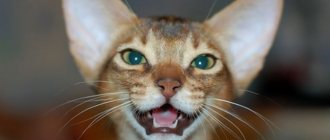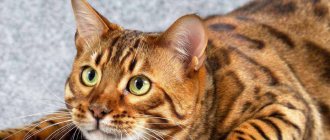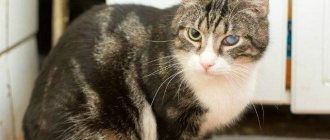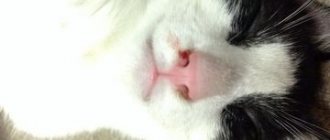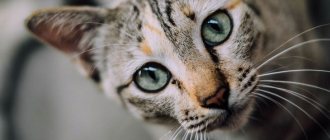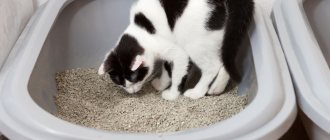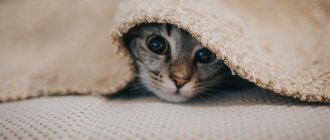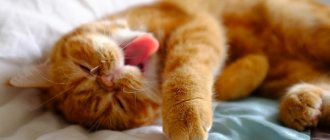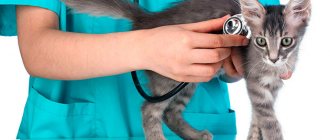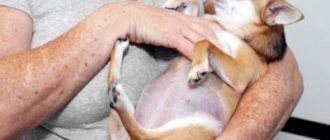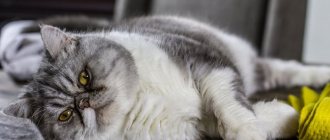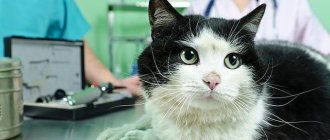Despite the comical nature of the situation when a cat rides on its butt, you should not laugh, but look for the cause of your pet’s illness. Of course, not every owner will immediately guess that the strange behavior of the four-legged animal is associated with severe discomfort...and will watch the “ride” for some time. When seizures become frighteningly frequent, anxiety will come, but let’s make a reservation right away: whatever the reason, there is no mortal threat behind this symptom.
When describing your anamnesis, you need to take into account that the desire to ride on your butt on the floor is always caused by severe itching. Due to its constitution, the cat cannot honor the causal place with its paws and gets out of the situation differently. In the initial stages, neither the owner nor the veterinarian will be able to identify the cause, at least visually. Since the condition does not require immediate intervention, it is recommended to act step by step, eliminating the causes one by one.
Helminths in cats
This problem is most often encountered by either very young kittens or naturally fed animals.
Insufficiently processed meat and fish retain worm eggs, so infection of a pet can occur even if the cat is not outside. Treatment consists of taking anti-worm medications. Such medications are toxic and can cause poisoning of the animal, so they must be selected by a veterinarian.
It is necessary to take your pet to the doctor and undergo a stool test, based on the results of which the veterinarian will select the optimal drug for treatment.
In some cases, simultaneous anthelmintic therapy may be required for all family members and other animals living in the house, since worm eggs easily enter the body upon contact with an infected animal.
Therapeutic techniques
If your cat becomes dehydrated from chronic diarrhea, she will need to be hospitalized for intravenous rehydration. When the inflammation is particularly severe, the animal must be put on a starvation diet for 24-48 hours, since the rectum needs time to restore the epithelial layer. Meanwhile, if chronic inflammation and scar tissue have formed in the colon, such simple techniques will no longer help. A surgical operation will be required, during which the affected areas of the organ will be cut out. It should be noted that with proctitis of fungal etiology, surgery is most often required, since pathogenic fungi greatly destroy the tissue of the affected organ.
The owner must provide the sick pet with a suitable diet containing a sufficient amount of dietary fiber. In ideal cases, the pet is fed special protein foods specifically designed for such cases. Adding bran to your food may be helpful. They improve digestion, enhance peristalsis, as a result of which the colon begins to better absorb water. This prevents the cat from becoming dehydrated. Just don’t overdo it, as these components can irritate the intestinal mucosa.
The list of prescribed drugs will depend on the root cause of inflammation. For example, for helminthic diseases, anthelmintic drugs are used, but it must be taken into account that a weakened animal’s body should not be “injured” by means that have a negative effect on the liver. Anti-inflammatory and immunosuppressant medications may be prescribed if an autoimmune reaction is the cause. Some types of colitis do not respond well to drug treatment: in these cases, surgery may again be required.
Diarrhea is one of the reasons for “riding on the butt”
Cats suffering from diarrhea may clean their butts on the flooring, carpet or other rough surface. In this case, the behavior of the animals has nothing to do with the quality and length of their fur. Thanks to friction, the pet tries to solve two problems at once:
- Get rid of extraneous, unpleasant odor.
- Eliminate itching sensations that occur due to irritation of the mucous membrane in the anal area.
Treatment. When the cat does not have frequent bowel movements, but is bothered by itching, veterinarians recommend using rectal suppositories that have enveloping and antibacterial properties.
Anal sinus problems
All cats have anal sinuses, located inside the anus. These sinuses contain a dark, odorous and oily fluid that is released along with feces during defecation and “marks” them with the smell of that particular animal. If you look closely at a cat's anus, you will notice two small dark dots, which are the canals of the anal sinuses. They can become clogged, causing the cat to feel irritation in the anus area
, which she seeks to remove by rubbing her butt. In severe cases, inflammation may develop, which will be even more painful and unpleasant for the cat.
The veterinarian can clean the anal sinuses, and if they become clogged frequently, he can show the cat’s owner how to do this at home.
Paraanal glands
The paraanal glands are located on both sides of the anus and serve to produce a special, sharp-smelling secretion that cats need for contact with their relatives. For a number of reasons, these glands can become clogged and inflamed, causing severe discomfort to the animal. You can suspect blockage of the glands based on the following symptoms:
- the cat scratches its butt on the carpet;
- the animal chews its own tail;
- your pet often scratches and licks its anus;
- an unpleasant odor appears.
Scratching the anus on the carpet in this case is nothing more than an attempt to free the glands from accumulated secretions. Blockage of the paraanal glands with subsequent inflammation develops against a background of frequent constipation and decreased muscle tone. Most often, owners of adult cats older than 3-4 years face this problem.
Another reason why a cat rides on its butt after using the toilet may be blockage of the paraanal glands. In this case, only a veterinarian can help. You should know that before squeezing out the secretion, an accurate diagnosis is necessary. Some veterinarians randomly begin to squeeze out the accumulated enzyme, and then say that there was no such need. The bottom line is that once a procedure is carried out, it requires regular repetition in the future.
There are glands around the cat's anus that secrete a strong-smelling substance. In its normal state, the liquid is a little thick. If a cat has metabolic disorders, the enzyme may become too thick or, conversely, liquid. This will lead to:
- accumulation of secretion in the paraanal glands;
- overactive glands.
In both situations, the animal will experience severe itching in the anal area
Cleaning the glands is not a salvation; it is important to determine the cause of metabolic disorders and changes that have occurred in the pet’s body. To carry out the procedure itself and for diagnosis, you should contact an experienced and trusted doctor, since some veterinarians find it beneficial to carry out cleaning once and repeat it subsequently
Severe inflammation is treated with antibiotics. The animal is put on a light diet and rectal suppositories are prescribed. Therapy can take two to six months, and after recovery, relapses are common.
General information
But what if your pet regularly undergoes deworming and what should you think when looking at its body movements?
The second common cause is inflammation (clogged condition) of the anal glands (sinuses). These are small glands that are located on either side of the anus, they look like a needle puncture. Under normal conditions, these sinuses clear spontaneously. When defecating, they emit an unpleasant odor, which serves to mark the territory and leave information by the owner for “competitors.”
The reasons why the sinuses begin to become clogged and their functioning is impaired are:
- Lack of physical activity and exercise, including obesity;
- Failure to comply with hygiene rules;
- Imbalance in nutrition and its result – diarrhea.
About eliminating parasites in cats
Since uninvited guests are a common cause of this behavior, the owner should regularly administer antiparasitic therapy to the cat. This is the administration of anthelmintics to animals. You should not think that a pet that does not walk outside is safe from parasites. They can enter your pet's body through raw fish and meat. This food is not recommended by veterinarians, but many owners ignore such advice and spoil their animals. As a result, infection with helminths occurs.
The cat becomes lethargic, eats poorly, sleeps a lot, and loses weight. And the reason for this is parasites that feed on vitamins and nutrients from the animal’s blood. They inject their waste products into it, which further weakens the cat’s body.
So, veterinarians recommend carrying out anti-parasitic measures once every three months, regardless of whether the pet is walking outside or not. Most often, cats are prescribed the following anthelmintic drugs: Febtal, Prazicide, Polyvercan, Cestal Ket, Prazitel, Milbemax, Milprazone. These drugs allow you to rid your pet of uninvited guests within 24 hours and improve its general condition. But before using them, be sure to read the instructions and strictly follow the dosage.
It is better to treat worms in a cat on the weekend, so that he is under your supervision for 8 hours after consuming the antiparasitic drug. Sometimes the owner's help may be required if constipation suddenly occurs: then the cat needs to be given a laxative.
Veterinarians advise carrying out anthelmintic therapy before vaccinating a cat. Then he will tolerate the vaccination more easily, and its side effects will be avoided.
An important aspect of antiparasitic therapy is proper care of the animal. This means, first of all, daily washing of the kitten's litter box with special products. Worm eggs and their larvae are very tenacious. Therefore, by going into a dirty litter box and licking its paws afterwards, a cat can become infected with helminths immediately after they are removed with tablets or solutions.
>Why do cats roll on the ground?
Metabolic disorder
Failures in metabolic processes lead to various disturbances in the functioning of the animal’s body. As a result, the consistency of secretory secretions often changes; they can become too thick and clog the ducts. Sometimes the glands begin to secrete more secretions than usual. In both cases, the skin becomes irritated, inflammation, swelling and itching occur. If the pet is not helped, then the risks of developing complications are high:
- The animal begins to actively move along the floor, which causes damage to the skin near the anus.
- The wounds become infected and an inflammatory process develops. The most dangerous thing is infection of ulceration by pathogenic bacteria.
- If left untreated, the inflammatory process spreads to the peritoneum.
Such violations lead to the pet becoming too restless. He can't find a place for himself and drives furiously at the fifth point.
If an animal has a weakened immune system, then there is a risk of developing infectious blood poisoning.
Also watch the video why a pet rides on its butt:
Complication of labor
First-born cats, having no experience of how to behave when a kitten gets stuck in the birth canal during pushing, sit on their tail and ride along the floor, trying to help, as with defecation. Experienced cats encourage the kitten to be born by massaging their belly with their tongue. Without the help of the owner or veterinarian, childbirth in an inexperienced cat will end in the death of not only the kitten, but also the cat itself.
VETERINARIAN CONSULTATION REQUIRED. INFORMATION FOR INFORMATION ONLY.
Administration
Dogs and cats lick under and around their tails and ride their butts on the floor for a variety of reasons. The most common:
Diseases of the paraanal glands.
Dogs and cats have two anal glands, one on each side of the anus. They can become very compressed and become infected. If this happens, the animal will lick the area of the anal glands to relieve pressure in them. Some animals also “ride” their butts across the floor if they have any problems with their anal glands.
The substance secreted by the anal glands is thick and has a very unpleasant odor. Most animals can release these glands on purpose for scent marking or in self-defense, like a skunk. Some cats have largely lost the ability to control the emptying of these pouches on their own. Normally, this occurs, for example, during normal bowel movements. If the glands become full, they become enlarged, inflamed, and interfere with bowel movements and even walking.
Check the anal glands immediately, especially if this animal has had problems with them before. If they overflow, you can try one of two ways to empty them:
External method - a napkin is pressed against the anus, and both sides of the anal area are compressed. If the secretion is very viscous (doughy), this method may not be sufficient to completely release the bags;
Internal method: We put on a rubber glove, smear the index finger with Vaseline and insert it into the anus. Now it is possible to squeeze the gland between the thumb from the outside and the index finger from the inside, which allows you to completely get rid of the viscous secretion.
If the paraanal glands are well cleaned, the itching under the tail goes away, and after a day or two the cat no longer tries to ride on its hindquarters. What can happen if the glands are not cleansed? An abscess may form and break through the skin. This is painful, and everything around will definitely be stained with the foul-smelling secretion of the inflamed paraanal gland. It is worth noting that this occurs quite often, but is mistakenly diagnosed as rectal bleeding. If your animal has an abscess of the paraanal glands, only a doctor can help.
What to do if the itching under the tail continues, as well as the “riding” on the butt? If a one-time cleaning of the glands does not help, the procedure is repeated after a few days. In some animals, it is necessary to return to cleaning the glands several times in a row until they can achieve a stable clean state. If the procedures are regular, the anal glands are consistently clean, but troubles continue, you should consult a doctor. Most likely, the cat is worried about an allergic reaction, flatworms, and possibly low lumbar pain.
Diseases and discharge from the genitals.
Females often lick the vulval area when they are in heat. They may do this if they have a uterine infection. Some females may develop vaginitis, which causes severe itching. The fourth reason for a female to lick the vulva area is the beginning of labor. Since you still have a small kitten, this reason can be discarded.
If you notice that your animal is paying increased attention to this part of the body, there is likely a medical problem and you should consult your veterinarian. This often looks funny and amusing, but in fact it hides a problem.
And of course, the cat is not doing this to cause mischief, so there is no need to scold her
This often looks funny and amusing, but in fact hides a problem. And of course, the cat is not doing this to cause mischief, so there is no need to scold her.
So, let's look at the main reasons.
Possible pathological disorders
Unfortunately, diarrhea and dirty fur are not the only factors that cause a cat to ride on its butt. There are also more serious factors that lead to this behavior, for example:
- mental health disorder;
- post-traumatic stress disorder;
- helminthic infestation;
- paraanal inflammation.
Each of the diseases deserves attention and requires consultation with a veterinarian. In addition, they are accompanied by other symptoms, in addition to “travels on the fifth point”.
Signs of mental disorder
With mental disorders caused by stress, the pet's behavior changes noticeably and becomes strange. The cat can:
The owner may notice that the pet begins to crawl on the floor, regardless of toilet procedures. In this case, it is recommended to immediately contact a specialist who will identify the pathology and prescribe appropriate therapy.
Phantom pain syndrome
After an injury to the hind legs or a fracture of the hip joint, the pet begins to look for a way to eliminate phantom soreness. He rolls on the floor, trying to get rid of the pain that is lingering in his brain. In such a situation, veterinarians prescribe medications that have a mild sedative effect to the animal. They help him cope with excruciating post-traumatic discomfort.
Parasite infestation
Most often, pets get pinworms and tapeworms, which live in the large intestine. To reproduce, many of them have to crawl to the entrance to the anus to lay eggs. This process is accompanied by a feeling of severe itching, which the pet tries to get rid of by crawling on the floor.
When infected with tapeworms, a feeling of bloating occurs in the intestines. The cat strives to get rid of feces, stimulating the anus while riding on the floor and causing defecation. To save your pet from such difficulties, you should regularly deworm it, using anthelmintic drugs for preventive purposes. These can be tablets for oral administration, drops on the withers area or other means.
Blockage of the anal glands
Mustachioed striped animals have anal glands, which are muscular sacs located in close proximity to the anus. They constantly produce secretions that are released through the ducts during bowel movements. It gives feces and urine a specific odor, allowing cats to leave “fragrant” marks on their territory.
Norm and deviations. In its normal state, the secretion is a thick, odorous substance. If the glands are not completely emptied, then corresponding disorders arise:
- the tissues of the muscle sacs are “overstretched”;
- irritation occurs in the glandular ducts;
- dermatological problems arise - small inflamed seals and bald spots form in the neck and along the spine;
- the paraanal glands swell greatly and become visible under the animal’s tail.
Consequences. If the owner does not pay attention to the blockage in time, then the disruption of circulation ends with the formation of a fistula and the penetration of the contents of the glands into the peritoneum.
Methods for cleaning the anal glands
Veterinarians can help you deal with the problem of blocked anal glands. Moreover, representatives of some breeds require regular cleaning - 1-2 times every 4-5 weeks:
- The veterinarian, using mechanical force, cleans the ducts, removing excess or thickened secretions.
- If the wounds are infected and inflamed, the cat is prescribed a comprehensive treatment: antibiotics, diet food and rectal suppositories.
- In case of advanced disease, when the mucous tissues are necrotic, surgical intervention is necessary. The affected membranes are excised.
There is a possibility of relapse, so it is recommended to visit the veterinary clinic periodically.
Preparing for DIY Cleaning
You can also clean the anal glands yourself by carefully squeezing out the secretion.
It is important to consider that the liquid is very odorous and you should properly prepare for the procedure:
- put on special clothes;
- use rubber, silicone or latex gloves;
- Place a stack of gauze napkins nearby.
Algorithm of actions. The process of cleaning the glands is carried out in stages:
- The animal is fixed. You can swaddle it for these purposes, leaving the area around the tail free.
- The tail is pulled to the side, opening the anus.
- With two fingers, press on the place just below the anus, using a napkin. As a result of a successful procedure, secretory fluid will be visible on the material.
- The movements should be continued until the gland sacs are completely cleared of secretion.
If the contents are too thick, you will need to insert a finger into the anus to remove it. The thumb presses on the gland from the outside, and the index finger applies pressure from the inside.
A cat riding on its butt is a strange and at the same time funny sight that makes inexperienced owners smile. But an owner with experience cannot be deceived; he knows that something is bothering the pet and he needs to help him as soon as possible. And to eliminate the risks of serious consequences, it is better to contact a professional.
Other reasons
As mentioned above, all causes are associated with pain or itching in the anus. Similar inconveniences can be caused by prolonged indigestion, eaten bones (which damage the intestines), neglect in care, colitis and similar pathologies.
Primary irritation of the intestinal mucosa causes pain and itching. This situation can be missed by picking up a dog (puppy) on the street. When the body becomes dehydrated, stool becomes very hard and dry, and the intestines and anus are damaged during bowel movements.
That is, a visually healthy dog eats and plays, but later, at one moment, begins to whine, refuses food and worries, feeling pain. The obvious sign is formed feces stuck in the anus. The condition is treated with oil suppositories and diet until the mucous membranes are completely healed.
Pressure in the intestines and the inability to empty them can also cause "driving", but in this case, the symptoms will not be the only one. An intestinal obstruction can be caused by a foreign object, bloating, gas buildup (flatulence), or volvulus (a fatal condition).
Blocked anal glands
The rear of the pet is clean, there are no foreign objects, the worms have recently been removed, but the cat is walking on the floor, what to do in this case? Definitely contact a veterinarian, since the cause is (most likely) a blockage. However, keep your cool and protect your pet from unnecessary procedures. Before cleaning the glands, a diagnosis must be made (and justified).
There are glands around your cat's anus that secrete a strong-smelling enzyme. In its normal state, the liquid is a little thick and does not stretch. If your pet has metabolic disorders, the secretion may become liquid or thick, which will lead to:
- Overactive glands.
- Accumulation of secretion in the glands.
The cat is one of the most difficult symbols that one has to deal with when deciphering dreams.
Perhaps in reality we encountered an amazing person who, despite all the difficulties, managed to avoid a seemingly imminent danger. After all, looking at precisely such people, we remember the folk wisdom: “He falls on his feet like a cat.”
The appearance of a cat in a dream can also be facilitated by meeting an independent, independent and slightly frivolous woman. And this is no coincidence, because in real life we call such a woman “a cat that walks on its own.”
Or perhaps the image of a cat in a dream arose as a result of the fact that memories of how the cat washed itself were deposited in our subconscious: the folk sign “The cat washes its face for guests” is no secret to anyone.
A cat can appear in a dream even when we are watching with pleasure how a young guy caresses and plays with a cat: after all, it’s rare that another folk wisdom does not come to mind at this moment: “He who loves cats will love his wife.”
What if we dreamed of a cat, as a warning of impending danger (after all, during the day we were very worried when a black cat crossed our path)?
But at the same time, we must not forget that in ancient times cats were deified and considered special animals. This means that any dream in which you saw a cat is prophetic. The most important thing is to be able to decipher it correctly.
Watching a cat wash itself in a dream means guests. It is possible that you will meet old good friends with whom you will have a great time.
Watching a dog hunt a cat in a dream is a warning that you should under no circumstances deceive your friends. Having learned about your deception, your friends will turn away from you forever.
Seeing in a dream a small kitten hiding in a tree from an angry dog is a sign that in real life you should be very careful.
If you dreamed of a kitten who, having noticed a dog in the distance, immediately runs to hide on the roof, then you should beware of a danger that you have already managed to avoid once.
If a cat scratched you in a dream, then in reality big problems await you, about which you will be very worried.
If you dreamed that a cat drove its claws right into your chest, then emotional anguish, sadness and sorrow await you.
Watching in a dream how a cat caught a mouse and carried it off to show its prey to other cats is a sign that in real life you are a very vain person.
Perhaps such a dream indicates that there are vain people around you who will bring you great misfortune.
If in a dream a black cat crossed your path, then in reality you should beware of dangers. Such a dream also suggests that you overestimate your strength, and therefore you should not refuse the help of friends.
Petting a cat sitting on your lap in a dream is a sign that in your environment there is a not entirely decent, frivolous woman who will greatly let you down by taking advantage of your trust.
Watching a young guy or a single man stroking a cat in a dream means that when he gets married, he will love his wife very much.
Watching several cats fighting in a dream is evidence that a streak of minor setbacks awaits you, so be patient and courageous.
If in a dream an unfamiliar cat caresses you, it means that one of your new acquaintances has decided to take advantage of your kindness and trust. Be careful.
Seeing a dead cat in a dream is a bad omen. Apparently, you will learn about the illness of someone close to you.
Problem details
Blocked anal glands should be treated at a veterinary clinic. This manipulation is done up to 2-3 times a month if the cat is a long-haired breed. A specialist must clean the ducts and, if they become inflamed, prescribe a therapeutic course (diet, suppositories and antibiotics).
To prevent this from happening, you will need to clean your sinuses at home. The procedure involves squeezing out the secretion. An unpleasant odor makes it necessary to wear protective clothing, rubber gloves, and also have a supply of wet or gauze wipes before manipulation. Before the procedure, the cat must be swaddled, leaving the tail free. Next, it should be placed on the back, freeing access to the paraanal glands.
The napkin is used to compress the skin on both sides below the anus. The secret will leave a mark on the napkin. Manipulation is carried out until the napkin remains clean. If the secretion has a dough-like structure, it is removed in another way that is not at all pleasant for the cat. The index finger is inserted into the anus. Using the fingers (thumb on the outside and index on the inside), the anal sacs are squeezed one at a time, and the secretion is squeezed out until it is completely released. The discharge of thick discharge can be facilitated by lubricating the animal's anus with an anti-inflammatory agent. Rectal suppositories are also suitable.
In case of loose stools, strange movement is also possible. Diarrhea causes irritation of the anus and surrounding skin, especially in short-haired breeds. A special structure prevents the animal from reaching this place with its paw. Severe itching forces him to sit on his tail and move his paws at high speed, relieving the discomfort.
Diarrhea or constipation is a consequence of poor nutrition. This should be corrected with a suitable diet and sufficient amounts of clean drinking water. If your pet is a long-haired feline, he should trim the hair under his tail. Diarrhea must be treated with rectal suppositories with an anti-inflammatory effect.
During childbirth (especially for the first time), a cat can also behave strangely. Floor riding is caused by a kitten stuck in the birth canal. The cat will try to release it; experienced animals help themselves by massaging their tongue in the abdomen. Primiparous cats may require veterinary care.
There is also a reason that causes booty riding - it is a foreign object (thread, a piece of cellophane or another similar thing) that is stuck in the intestines. Blockage occurs within the next 8 hours after ingestion of a foreign body. The release of an object on its own is classified as a lucky event. The deteriorating condition of the pet should force the owner to take him to the veterinarian, there are no other options for help!
Attracting the owner's attention can also be associated with riding his butt on the floor. The cessation of such strange behavior is associated with stroking and other manifestations of care from the person. The nature of this psychological state of thirst for attention is stress, trauma or fracture. Veterinarians note the rarity of these cases.
Why does a cat move its butt on the carpet?
In cats with long hair, the reason that it moves on the floor is the remains of feces under the tail. If during the process of defecation a cat has problems with bowel movements, the animal rides on its tail and tries to squeeze out the remaining feces from the intestines and clean the anus. This can happen if the stool is too thick.
In addition, it can get tangled in the animal's thick fur and create discomfort. Then the cat cannot get rid of feces. She will try to do this, and rides her butt on the rough surface. The cat rolls its butt on the carpet, because in this case the carpet is the most suitable option.
Too loose stool is also the reason that the cat moves around and wipes its butt on the floor. Diarrhea causes irritation of the anus itself and the skin around it in short-haired breeds. The cat cannot reach this place with its paw. The only way she can get rid of the painful sensation of itching is to sit on her butt and move her front paws and walk along the floor.
Dietary disorders that cause your cat to have constipation or loose stools can be corrected with an appropriate diet and sufficient water. For long-haired beauties, it is recommended to trim the fur near the anus so that feces do not remain in the fur. For diarrhea, the cat is given rectal suppositories to relieve inflammation in the rectum.
Foreign object
Another reason why a cat moves its butt on the floor or carpet may be the presence of foreign objects in the intestines. The animal comes out of the tray, and something sticks out of the anus. Naturally she tries to fix the mess. This situation may occur if the cat accidentally swallowed thin cellophane, thread, rubber band or similar things. The owner’s task is to remove the foreign body as quickly as possible and prevent similar incidents in the future.
It is necessary to understand that the natural yield of elastic or oilcloth is luck. Gastric juice cannot dissolve polymers, so absorption of cellophane can lead to intestinal blockage. The gastrointestinal tract is physically blocked. Typically, the blockage is not noticeable for up to 8 hours. During this period, the pet behaves naturally and even goes to the toilet. Afterwards the condition quickly worsens. Only a veterinarian can help in case of obstruction.
Age characteristics
The kitten rides on its butt after using the toilet if it accidentally swallowed an indigestible object. This happens during the change of baby teeth in cats, when, due to unbearable itching in the jaws, they gnaw on everything possible.
Having swallowed a piece of plastic, a ball of woolen threads that do not completely come out of the intestines, the cat rides on its butt on the floor, thus trying to remove the object from the rectum.
Plastic film can get into the cat's stomach, which causes a blockage in the intestines, since it does not come out with feces. If such situations arise, when a cat rides on its butt on the floor for no apparent reason, veterinarian intervention is required, including surgery.
Curing a pet from the desire to ride on its butt on the floor means helping it get rid of unpleasant sensations.
Parasites
Riding on the butt always indicates itching, and the second most popular reason for this phenomenon is worms! The phenomenon indicates an impressive invasion, that is, there are so many parasites that they do not fit in the “deep” parts of the intestine. Another option is worms that like to get some fresh air, that is, crawl out of the anus and return home. Many roundworms behave this way, including the common roundworms.
Treatment is anthelmintic drugs, but do not rush to calm down by feeding the drug to the tailed animal. If there has been a severe infestation, the pet’s health can be undermined by the larvae, which can travel in the bloodstream and penetrate the liver, heart, lungs and even the brain. It is worth understanding that several types of worms can live in one host (dog), and this is especially often observed in adult “twin dogs” that have fed on garbage dumps.
Fortunately, veterinary medicine and the pet industry do not stand still. If you seek help without delay, the chances of recovery are one hundred percent. You cannot guarantee to protect your dog from worms, so prevention is important. Remember that 1.5–2 thousand helminth eggs can “travel” on the soles of your shoes alone!
Why can a kitten ride “butt”? What means? Review
Some attentive owners are concerned about the question - the kitten rides on its butt - why?
Some people find these movements funny and humorous, but there is clearly a serious problem. There are many causes and consequences of “riding on the butt”; this story will help you understand them.
The very first answer to the question is helminthic infestations. Indeed, parasites can pester the baby and cause him anxiety in relation to his rear end. Some types of worms that settle in the intestines and stomach can cause severe discomfort to the kitten, causing itching and pain. A strong desire to “scratch” the anus is the reason for floor riding.
